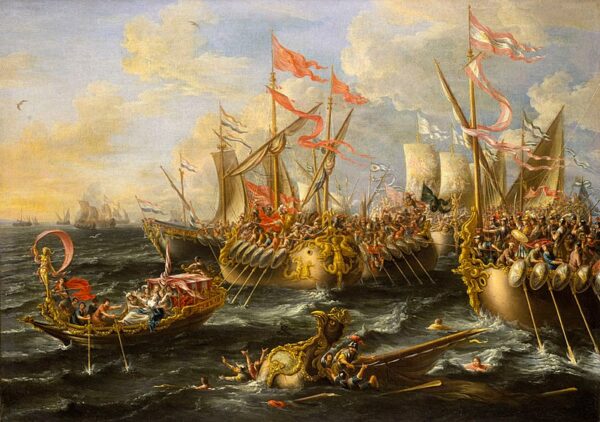The Battle of Actium, fought on September 2, 31 BC, was a decisive naval confrontation that marked the culmination of the power struggle between Octavian (later Augustus, the first Roman Emperor) and the combined forces of Mark Antony and Cleopatra VII of Egypt. This battle took place near the city of Actium, off the western coast of Greece, and it played a critical role in shaping the future of the Roman Empire.
In the years leading up to the battle, Rome was engulfed in a complex civil war, with various leaders vying for control. After the assassination of Julius Caesar in 44 BC, his adopted heir, Octavian, formed the Second Triumvirate with Mark Antony and Lepidus to defeat Caesar’s assassins. However, the alliance soon unraveled due to personal ambitions and political differences, particularly between Octavian and Antony. Antony’s relationship with Cleopatra, the Queen of Egypt, further strained his ties with Octavian, who capitalized on Roman disdain for foreign influence and portrayed Antony as a traitor to Rome, swayed by Cleopatra.
The conflict reached its peak in 32 BC when Octavian declared war on Cleopatra, effectively turning the Roman Senate against Antony as well. The two forces prepared for a final showdown, with Antony and Cleopatra amassing a formidable fleet and army in Greece, while Octavian, under the command of his capable admiral Agrippa, prepared his forces for a naval engagement.
The battle commenced in the early morning of September 2. Antony’s fleet, comprising around 500 ships, was large but cumbersome, with many of the vessels heavily armed but less maneuverable. Octavian’s fleet, though smaller at around 250 ships, was more agile and better suited for the open sea battle that ensued. The tactics employed by Agrippa, who had blockaded Antony’s supply lines and harassed his forces in the preceding months, further disadvantaged Antony’s position.
As the battle raged, Cleopatra, who was present with her own fleet, suddenly retreated with her ships, a move that has been interpreted variously by historians as either a strategic withdrawal or a signal of defeat. Antony, deeply affected by Cleopatra’s departure, chose to abandon the fight and follow her, leaving his remaining forces in disarray. The bulk of Antony’s fleet surrendered or was destroyed, and his army, demoralized by the defeat at sea, gradually defected to Octavian.
The aftermath of the Battle of Actium was decisive. Antony and Cleopatra fled to Egypt, where they ultimately committed suicide in the face of Octavian’s advancing forces. Their deaths marked the end of the Ptolemaic Kingdom of Egypt and the last vestiges of the Hellenistic period. Octavian returned to Rome as the unchallenged ruler of the Roman world, and in 27 BC, he was granted the title of Augustus by the Senate, effectively ending the Roman Republic and inaugurating the Roman Empire.
The significance of the Battle of Actium cannot be overstated. It not only ended a protracted civil war but also paved the way for the establishment of a new political order under Augustus. The battle is often seen as the turning point that led to the Pax Romana, a period of relative peace and stability that lasted for over two centuries. Moreover, the events surrounding Actium have inspired countless works of literature, art, and drama, cementing its place as one of the most famous and pivotal battles in ancient history.






